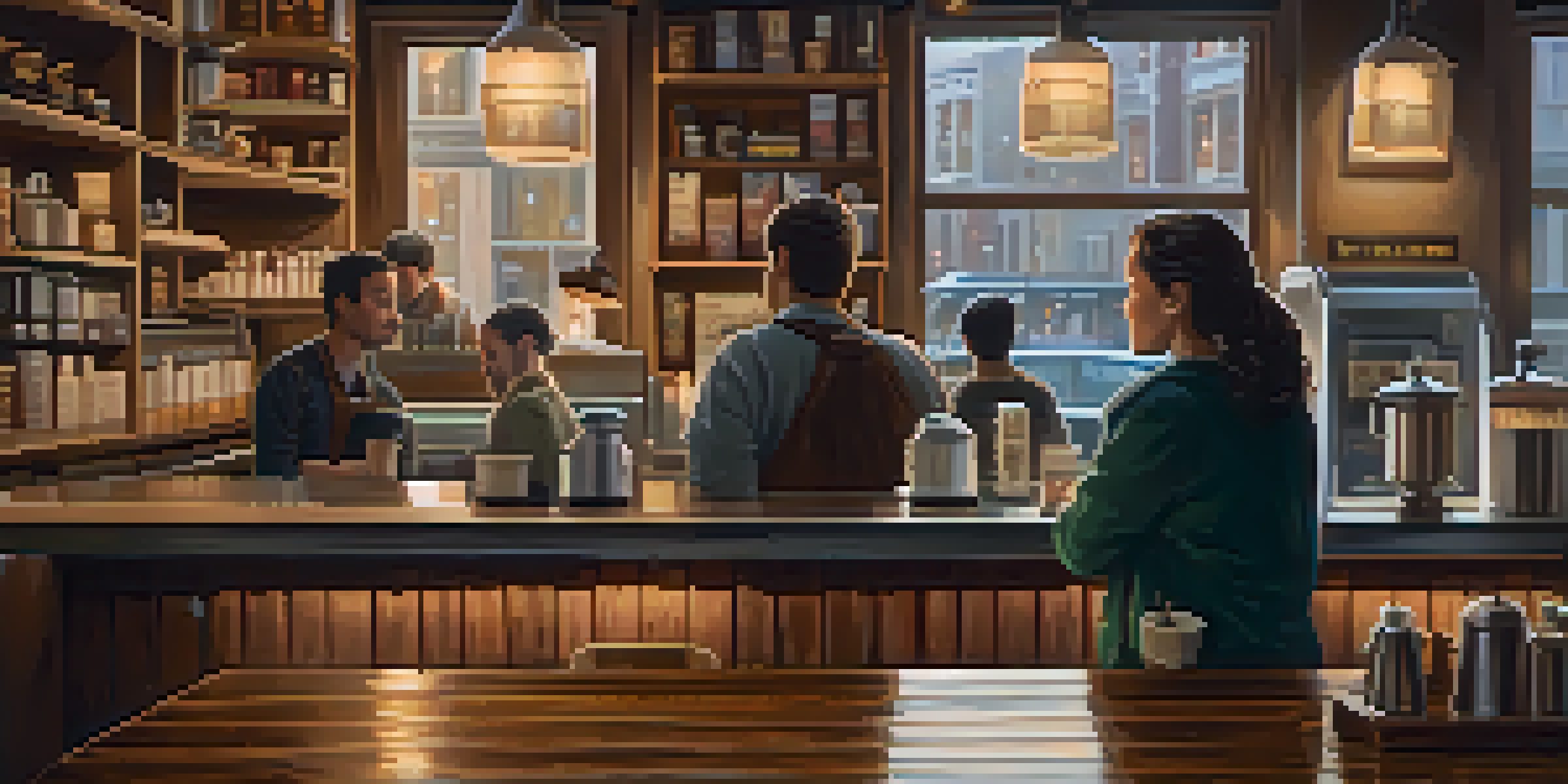The Use of Dark Humor in Hollywood: Risks and Rewards

Understanding Dark Humor: What Is It Really?
Dark humor, often referred to as black comedy, takes serious subjects and presents them in a humorous light. This genre thrives on irony and the absurdity of life’s harsh realities, allowing audiences to laugh at topics that might otherwise be taboo. Think about films like 'Dr. Strangelove' or 'The Joker'—they tackle serious themes while inviting viewers to find humor in the darkness.
Comedy is simply a funny way of being serious.
The essence of dark humor lies in its ability to confront discomfort. When we laugh at dark subjects, it can create a sense of relief, almost like a coping mechanism. It's as if we’re saying, 'Yes, this is tragic, but let’s find a way to laugh about it.' This blend of humor and seriousness can often lead to deeper conversations about societal issues.
However, dark humor is a double-edged sword. While it can foster a sense of community among those who appreciate it, it can also alienate or offend others. The challenge for filmmakers is to strike the right balance, ensuring the humor resonates without crossing the line into insensitivity.
The Appeal of Dark Humor in Film and TV
Dark humor often appeals to audiences looking for something more than just surface-level entertainment. It engages viewers by provoking thought and challenging societal norms, making it a favorite choice for filmmakers who want to stand out. Movies like 'American Psycho' or series like 'BoJack Horseman' illustrate how dark humor can be both entertaining and profoundly reflective.

This genre often attracts a niche audience that appreciates the complexity behind the jokes. It can invite viewers to explore uncomfortable truths about life, death, and the human condition. It’s this exploration that can turn a simple joke into a powerful commentary on society.
Dark Humor Balances Seriousness
Dark humor allows audiences to confront uncomfortable truths while finding laughter in life's harsh realities.
Moreover, dark humor can serve as a form of social critique. By using satire to address controversial issues, filmmakers can encourage audiences to reflect on their beliefs and perspectives. This can ultimately lead to a richer viewing experience, as viewers grapple with the underlying messages behind the humor.
The Risks of Using Dark Humor in Storytelling
While dark humor can be a powerful tool, it carries inherent risks. Misjudging the tone or context can alienate audiences, leading to backlash or negative reviews. For instance, jokes that trivialize serious issues like mental health or tragedy can come across as offensive, causing more harm than good.
The purpose of humor is to help us cope with the inevitable suffering and absurdity of life.
Additionally, cultural differences play a significant role in how dark humor is perceived. What might be considered funny in one culture could be deeply offensive in another. This makes it crucial for filmmakers to be aware of their audience's sensitivities and backgrounds when crafting their stories.
The risks associated with dark humor can also extend to the creative team involved in the project. Actors and writers may face scrutiny for their involvement in a film that crosses the line. Thus, it’s essential for creative minds to have open discussions about the potential impact of their work before bringing it to the big screen.
Successful Examples of Dark Humor in Hollywood
Several Hollywood films have successfully navigated the complexities of dark humor, proving that it can be both funny and thought-provoking. 'The Royal Tenenbaums' is a prime example, blending quirky characters with tragic backstories in a way that evokes both laughter and empathy. This balance is key to creating stories that resonate with audiences.
Another noteworthy example is 'Fargo,' which combines crime with darkly comedic elements. The film's ability to present a murder mystery through a lens of absurdity showcases how dark humor can enhance storytelling, making it memorable and impactful. This clever juxtaposition keeps viewers engaged while addressing serious themes.
Cultural Sensitivity is Key
Filmmakers must navigate cultural differences to ensure dark humor resonates without causing offense.
TV shows like 'It's Always Sunny in Philadelphia' also excel in this realm. By tackling controversial subjects with a satirical approach, the series invites viewers to laugh at the absurdity of the characters' actions while reflecting on moral dilemmas. These successful examples highlight the potential of dark humor to entertain while provoking thought.
Navigating Controversy: When Humor Goes Too Far
The line between edgy and offensive can be thin, and navigating this territory is tricky for Hollywood creators. Certain jokes might resonate with some audiences but fall flat or offend others. Understanding when humor crosses the line is crucial to avoid backlash or controversy that could overshadow a film’s message.
Instances where dark humor has gone too far have sparked considerable debate. Comedians and filmmakers have faced criticism for jokes that touch on sensitive topics, raising questions about free speech versus accountability. This ongoing dialogue is essential as it shapes the future of comedy and storytelling in Hollywood.
Ultimately, the challenge lies in being mindful of the diverse perspectives within an audience. Creators must ask themselves: does the humor serve a purpose, or is it merely shock value? This reflection can guide them in making choices that are both funny and respectful, fostering a more inclusive viewing experience.
The Role of Audience Reception in Dark Humor
Audience reception plays a pivotal role in determining the success of dark humor in films. What one group finds hilarious, another may find offensive, making it essential for creators to gauge their target demographic. Engaging with audiences through screenings or social media can provide valuable insights into how humor is perceived.
Cultural context also influences audience reactions. Different backgrounds and experiences shape individual perspectives on humor, leading to a varied reception of dark comedic elements. This diversity can spark rich discussions about the themes explored in the film, ultimately enhancing the viewing experience.
Audience Reception Shapes Humor
The success of dark humor hinges on audience perception, making it essential for creators to understand their demographic.
Moreover, audience feedback can help filmmakers refine their approach to dark humor in future projects. By understanding what resonates and what doesn’t, creators can navigate the complexities of humor more effectively, ensuring their work connects with a wider audience while still challenging norms.
The Future of Dark Humor in Hollywood
As societal norms continue to evolve, the landscape of dark humor in Hollywood will undoubtedly change. Filmmakers will need to adapt to audience expectations while remaining true to their creative vision. This balancing act will shape the future of dark comedy as it seeks to address new realities and perspectives.
Innovative storytelling techniques and diverse voices in the industry can pave the way for fresh takes on dark humor. As more creators from different backgrounds enter Hollywood, we can expect an expansion of the themes and styles explored within this genre. This diversity can enrich the conversation around dark humor and its role in storytelling.

Ultimately, the future of dark humor in Hollywood hinges on its ability to provoke thought while entertaining. As audiences become more discerning, filmmakers will be challenged to push boundaries responsibly, crafting narratives that resonate and encourage meaningful dialogue. The journey ahead promises to be as compelling as the stories themselves.